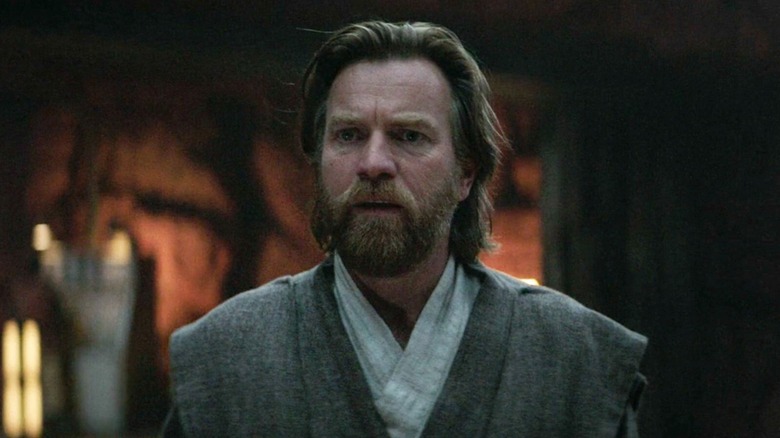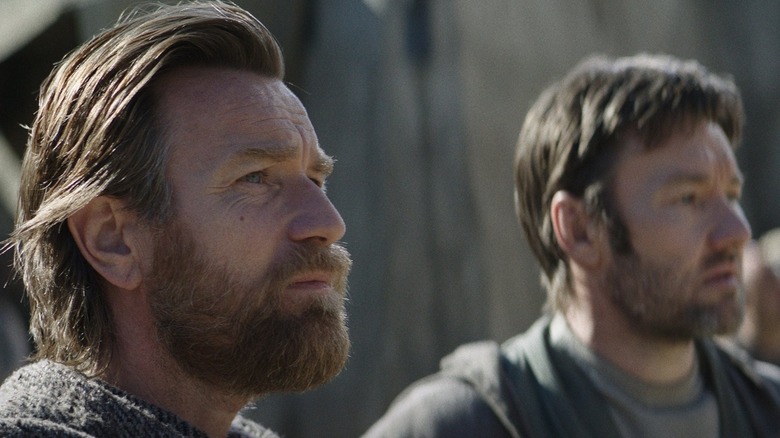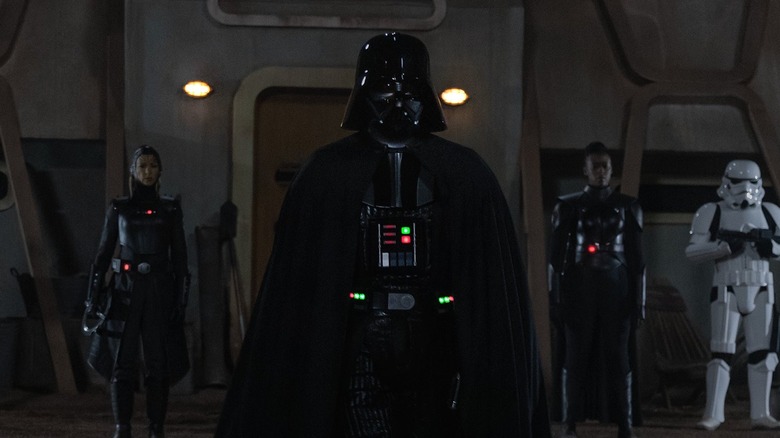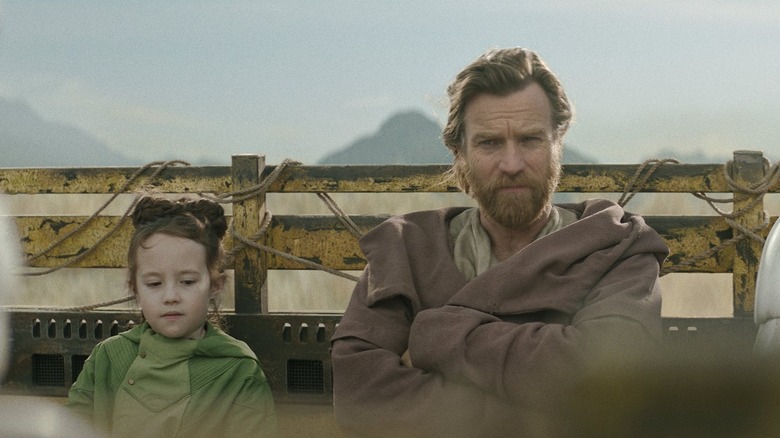Obi-Wan Kenobi Should Have Been A Movie — Here's Why It's Not
We are now two-thirds of the way through "Obi-Wan Kenobi" on Disney+, with just two episodes to go before Ewan McGregor's long-awaited return to the "Star Wars" universe packs it in. This has been years and years in the making as fans have been calling to see the actor reprise his role from the prequels, with Disney and Lucasfilm finally giving in with this limited series set between the events of "Revenge of the Sith" and "A New Hope." It's a big deal, but it probably should have been an even bigger deal. What do I mean by that? I mean it should have been a theatrically released movie.
The success of "The Mandalorian" proved that TV could be possible for "Star Wars," something that George Lucas wanted to do with "Star Wars: Underworld" years before he sold Lucasfilm to Disney. But it was also years before streaming paved the way for the type of TV that could be produced at truly cinematic levels. Be that as it may, "Star Wars" still feels the most like "Star Wars" on the big screen, largely because this all started in packed movie theaters back in 1977. So much of what is going on in this show deserves that cinematic treatment because a lot is being lost in translation here, and that is a real shame.
It isn't making use of episodic storytelling
One thing that makes TV shows appealing to streaming services like Disney+ as opposed to movies is that longevity is key. With episodes being dropped weekly, generally speaking, that means viewers have to stay subscribed longer and the conversation surrounding a big "Star Wars" series, especially one that features Darth Vader, can go on for well over a month. Even if you're Netflix and drop full seasons all at once, a lot of viewership data in the modern era is measured in minutes, giving TV shows an edge as well. Shows are appealing from a business perspective.
The problem is that not every story is suited to the medium of TV, especially something that is carved up and released over several weeks. One thing that continues to happen is that certain shows end up feeling like six-hour movies (give or take) that are stretched out and given somewhat arbitrary breaking points to make them episodic. This has hindered "Obi-Wan Kenobi" as those breaks are only serving to get in the way of the story at hand, making us wait days to pick up a direct plot thread. It isn't episodic in nature at all. It is not making good use of the medium of television.
"The Mandalorian" worked incredibly well, in part, because it did make very good use of episodic storytelling while maintaining through lines. "The Clone Wars" and "Rebels" did this as well on the animated side long before live-action came into play. Unfortunately, much in the same way that "The Book of Boba Fett" suffered from the "stretched-out movie as a TV show" problem, this show is now feeling it, too. But it feels even more erroneous in this case.
Big moments feel small
Another key factor here has to do with the nature of TV vs. movies. Sure, we all (generally speaking) have pretty nice TVs in our homes these days, and they often have pretty nice speakers attached to them now. The home viewing experience is miles better than it used to be, but it still has its limitations. Sitting in bed watching something alone at 3 in the afternoon will never have the same effect on someone as sitting in a crowded theater with other people who are sharing in a communal experience. That experience has always been dialed up to 11 when it comes to "Star Wars" as well. Given how many fans were excited about this project, one can only imagine the energy that would have emanated from those theaters. That is impossible to recreate at home no matter how nice your 4K television is.
Another thing to consider is, yes, Disney is spending what might best be described as stupid money on these shows, as they are with the Marvel shows as well. They have budgets comparable to that of their movie counterparts. But that budget is being stretched across hours and hours of TV, as opposed to two (ish) hours of a movie. Having to stretch those dollars really shows at times. Something is being lost there, even if "Obi-Wan Kenobi" most certainly looks very good. But does it look movie quality in the truest sense, particularly in the "Star Wars" universe? It would be tough to argue that it does.
These factors serve to make big moments in this show feel smaller than they have the right to. That rematch between Darth Vader and Obi-Wan in the show's third episode should have felt downright historic. Something about it being on TV robbed it of something. The Inquisitors debuting in live-action should have been a bigger deal. Hell, Hayden Christensen's return to "Star Wars" after all these years as Darth Vader, alongside McGregor once again no less, damn well feels like something that should have been in a "Star Wars" movie. After all, this whole relationship started on the movie screen with the prequels. Not to mention the Leia of it all. Something is being lost in translation, and it's a big something.
So, why wasn't Obi-Wan Kenobi a movie?
So, now the big, lingering question: why wasn't "Obi-Wan Kenobi" a movie? How is it that the brass at Disney and Lucasfilm decided to turn what was a movie into a streaming TV show on Disney+ instead? The answer is somewhat two-fold but it ultimately goes back to 2018 and the release of "Solo: A Star Wars Story." I am very aware that movie has its fans but, when it comes to dollars and cents, it was a pretty gigantic failure for the studio. It earned an all-time low for a live-action "Star Wars" film, taking in just $392 million against a miserably inflated $275 million budget.
While many hardcore fans are surely aware, the budget ballooned due to the firing of Phil Lord and Chris Miller well into filming, paving the way for Ron Howard to take over. In any event, the movie's relative financial failure, coupled with the mixed reactions to "The Last Jedi" just a handful of months prior to the release of "Solo," led Lucasfilm to completely rethink its strategy on the movie side of things. All focus was put into Episode IX, which ultimately became "The Rise of Skywalker." Everything else? It was either put on the backburner or scrapped entirely. And that includes the "Obi-Wan Kenobi" movie as it once existed.
Meanwhile, Lucasfilm was prepping "The Mandalorian" as the first live-action TV show in the history of "Star Wars" to help launch Disney+. It turned out that this went better than anyone could have hoped, prompting the brass at the studio to double down on the shows rather than focus on spin-off films. This, in turn, provided a new path forward for Ewan McGregor's long-awaited solo project. Whether or not it was for the better, it made better business sense at the time as streaming is (or at least was) viewed as the future, and "Solo," wrong or not, led Disney/Lucasfilm to believe spin-off films were a bad idea.



